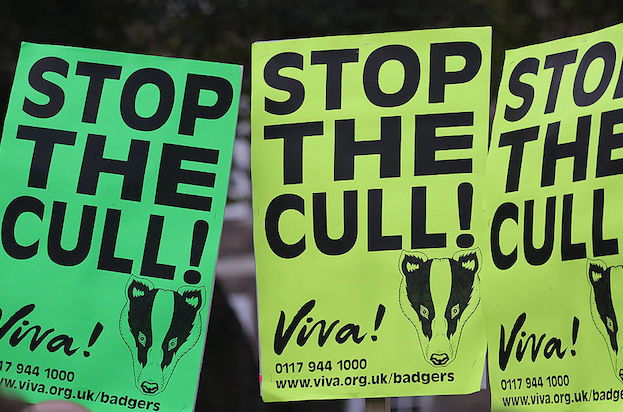Another attempt to bring animal rights activism off social media and into the real world has faltered. Nothing changes, does it? But before we move on past another small march in Westminster, it might be an idea to stop and take stock of the irregularities. There are lessons to be learned for politicians, for the media and for the BBC in particular. If you missed it, and you probably did, there was a march in Westminster this past weekend. There may have been more than one for all I know; small protests in London are not uncommon. But the march in question was led by the BBC’s own Chris Packham, with a supporting cast of animal rights organisations. It was a little incoherent, seeking to ban a range of activities including badger culling, legal hunting and grouse shooting, issues that are linked only by the fact they take place in the British countryside. In the office we took to calling it the ‘Ban Everything’ march.
The Ban Everything march was billed as ‘Britain’s largest ever wildlife protection march’ by the Times the day before the event had even taken place, in an article discussing the internecine strife that was afflicting the march’s organisers. On the day, the Guardian and the Mail both published pieces online describing the ‘thousands’ who had taken to the streets.
Trouble is, these breathless descriptions of mass movement proved to be singularly untrue. A blogger who spoke at the march put the attendance at ‘over 600’, later clarifying they meant ‘over a thousand’.
Is that the ‘largest ever’ animal rights march in British history? I have no idea to be honest. I know that 116,000 people went to the Game Fair to celebrate all that’s great about shooting, hunting, fishing and the rural way of life just two weeks earlier. I know that the Countryside Alliance’s Liberty and Livelihood March put 400,000 on the streets back in 2002.
I also know that this is a bit embarrassing for the print media. Why had the Times, Guardian, Mail and a plethora of local papers written about an historically enormous march with thousands of attendees when nothing of the sort took place? Because that’s what the press release said would happen, it is what the organisers thought would happen, and presumably these news stories were written before the news had actually taken place. The broadcast news can be more nimble – Channel 4 News went along to report the march but later decided it wasn’t worth covering. The print media’s copy was already written, and they were committed to reporting on the ‘thousands’ of protestors, even though these people never turned up.
Hopefully this will be a lesson for the press. The animal rights movement can generate Twitter trends, online petitions and lots of social media noise, but has no traction at all in the real world. Never take a press release claiming mass public support for animal rights causes at face value.
Another question one might ask of the press is why they wrote up this story at all. Protests take place in London all the time, and it seems a perennial source of frustration to protestors that no one pays them any attention. Why was this one different? Because the BBC’s Chris Packham was leading it.
It is fairly obvious that the 599-999 other protestors could have stayed at home for all anyone cared. The press wrote this one up because a BBC presenter was on the street calling 600,000 British citizens ‘psychopaths’ because they go game shooting – and remarkably, the BBC were letting him do it. Even people with no interest in hunting, shooting or fishing (i.e. the vast majority of people) can see that this is not a sustainable situation for our publicly-funded broadcaster, and the BBC needs to finally sit up and take notice of their rogue presenter’s activities.
So the media in general, and the BBC specifically, has lessons to learn. But what of the politicians? I’ve been meeting with parliamentary candidates from the last election discussing their experiences of campaigning in rural seats. A common theme, particularly among first timers not yet hardened to the constant barrage of online activism, has been that of email inboxes full of animal rights concerns.
Our consistent message to politicians is that these emails, tweets and petitions are in no way indicative of public opinion. The animal rights message is simplistic, and spreads well on social media. Some people click the links, send the mass emails and sign the online petitions, but this is no indication of strength of feeling. Time and again polling has shown that animal rights issues have no bearing on the wider public’s voting intentions, a point firmly underlined by the failure of the Ban Everything march to turn out the ‘thousands’ of people the organisers clearly expected. Politicians should take note: these online phenomena stay online, and they are no electoral threat. Wildlife management decisions can and should continue to be made on trends in the scientific evidence, not trends on Twitter.
Liam Stokes is the Countryside Alliance’s head of shooting.






Comments